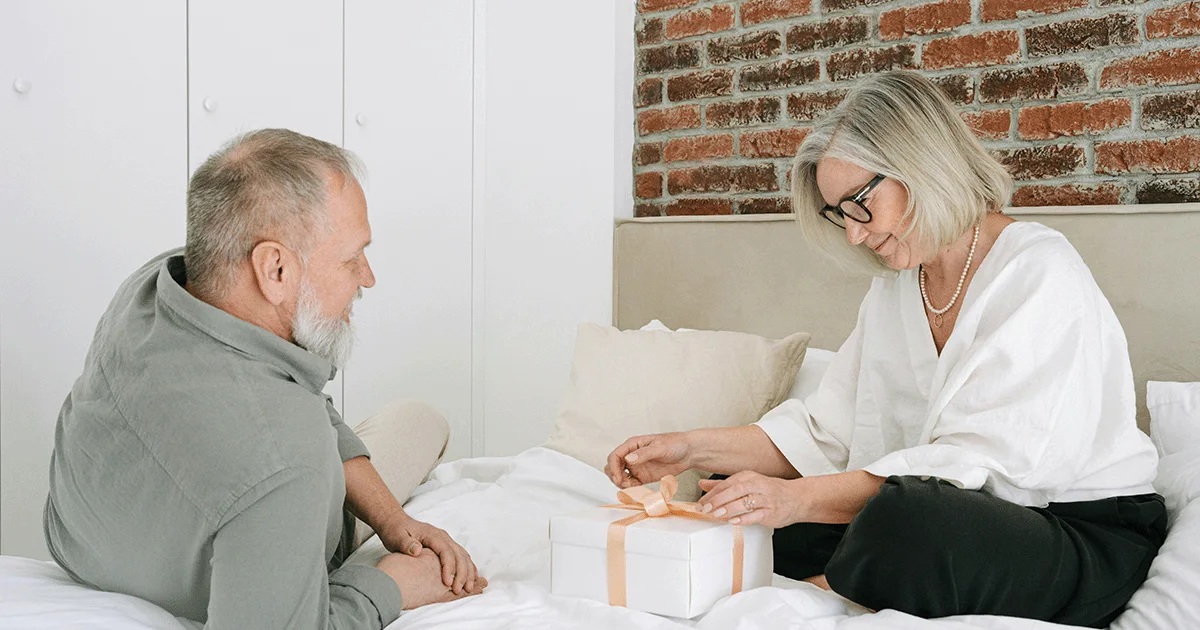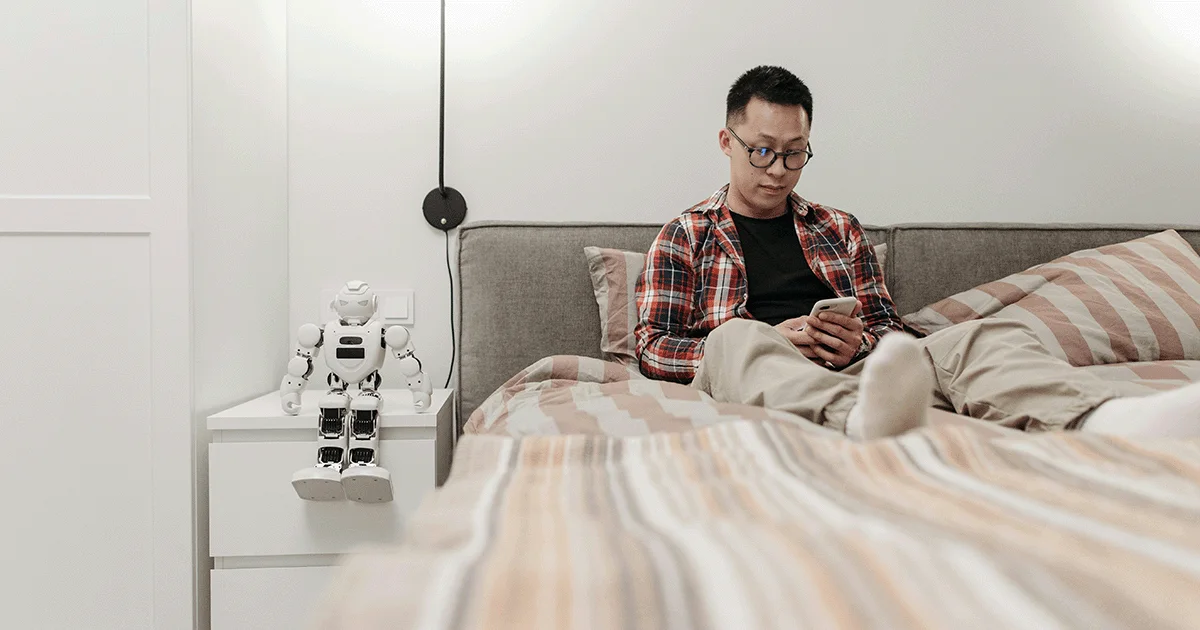Key takeaways
Morning wood is a normal and healthy phenomenon experienced by many men, from childhood through old age.
Morning wood—formally, nocturnal penile tumescence (NPT)—actually occurs while you sleep, usually during rapid eye movement (REM) sleep.
If you stop getting morning wood, it could be a sign of erectile dysfunction (ED) or another health issue.
Here's what we'll cover
Here's what we'll cover
Here's what we'll cover
Key takeaways
Morning wood is a normal and healthy phenomenon experienced by many men, from childhood through old age.
Morning wood—formally, nocturnal penile tumescence (NPT)—actually occurs while you sleep, usually during rapid eye movement (REM) sleep.
If you stop getting morning wood, it could be a sign of erectile dysfunction (ED) or another health issue.
Picture this: You’re jolted awake by your alarm. But before you can hit “snooze,” you become keenly aware of something down there: morning wood.
It’s safe to say that no matter what the rest of the day brings, it surely got off to a good start. After all, morning wood is a healthy bodily function and regularly waking up with an erection tends to mean all systems (needed for sexual wellbeing) are a-go. But what if you don’t frequently experience morning wood? It could indicate that your testosterone levels, blood flow, or something more serious is off.
Ready to learn more? Ahead, answers to your pressing morning wood questions, from why it happens to what morning wood means for your sexual function and overall health.
What is morning wood?
Formally known as nocturnal penile tumescence (NPT), morning wood is a normal physiological phenomenon that many people with penises (for the sake of this article, men) experience throughout their life.
But wait, it’s actually nocturnal? Here’s the deal: NPT occurs spontaneously 3–5 times a night, i.e. while you’re sleeping. So, if you wake up with an erection, it’s likely just NPT that happened in the early morning hours while you were still sleeping.
What causes morning wood?
While there's seemingly no shortage of evidence for the existence of NPT, the verdict is still out on the exact reason it occurs. Here’s what we do know about what causes morning wood:
Men typically have up to 5 nocturnal erections during an 8-hour sleep cycle, and each erection can last 25–35 minutes, though total duration may vary. That's about one erection every 90 minutes. It didn't take long for researchers to note that this pattern was strikingly similar to another 90-minute cycle that occurs during sleep: REM (rapid eye movement), aka the dreaming phase of sleep.
Interestingly, morning wood (and NPT overall) does not seem to be related to what you’re dreaming about—even if it’s a sexy dream—or your previous sexual activity.
Nocturnal erections may be caused by norepinephrine production slowing down during REM sleep. Norepinephrine is the chemical primarily responsible for keeping the penis relaxed. In other words, the part of the brain that maintains norepinephrine levels gets turned down during REM sleep. This lets the testosterone-related excitatory mechanisms take over, including blood flow to the penis, which can cause an erection.
It’s also possible that testosterone levels play a role in morning wood, as they’re usually at their highest in the a.m., specifically when you wake up from REM sleep. That being said, the relationships between androgens (such as testosterone) and penile erection function are complex and, according to research, “still a matter of controversy.”
Who gets morning wood?
Men of any age can experience morning wood and erections in their sleep, well before puberty and well into old age. In fact, they’ve been documented in men 3–79 years of age, with some even experiencing NPT during infancy. As you get older, however, you might experience fewer episodes of morning wood. This could be the result of declining testosterone levels (which occurs naturally as men age) or the product of other health complications, such as issues with blood flow or blood vessels (issues that are also more common in older age groups).
As mentioned above, NPT typically occurs 3–5 times per night. Total duration of erections can vary. One small study of healthy male volunteers found that the minimum duration of a single erection episode was 16.4 minutes, while the maximum duration was 35.8 minutes.
Altogether, NPT is considered a normal and healthy occurrence of sleep and a sign that the penile tissue—and the blood and nervous system that supports it—is in good health. So, if you’re regularly getting morning wood, that’s great. And if you’re not…
What does it mean if you stop getting morning wood?
Waking up with morning wood is totally normal and a sign of healthy sexual function. You might not rise and shine with a hard-on every single day, and that’s okay. But if you seemingly never wake up with morning wood or you notice a sudden decline in a.m. erections, it could be a sign of an underlying medical issue—namely, erectile dysfunction (ED).
ED isn't just a problem for older men. A growing number of young men are diagnosed with ED every year. Studies have estimated that as many as 30% of young men (under 40 years old) experience ED. Just over half (52%) of men aged 40–70 years old are estimated to have ED, with increasing prevalence as they get older.
ED can be caused (or worsened) by a wide variety of factors, from underlying mental and physical health issues to certain medications. Common causes of ED include:
Aging
Heart disease
High cholesterol
Smoking
Alcohol use
Anxiety, depression, among other psychological issues
Hormonal imbalances, including low testosterone (aka low T)
Sleep apnea
Medications, such as antidepressants, blood pressure medications, and prescription painkillers
What to do if you don’t have morning wood
If you suddenly stop having morning wood or don’t regularly wake up with it, you might want to contact your healthcare provider. They can help diagnose any underlying issues contributing to your ED and recommend medications or lifestyle changes that can help your condition.
Address underlying causes
Again, morning wood—or lack thereof—can be a sign of ED, which could be related to an underlying health condition. Your healthcare provider can run various tests to check certain biological markers, such as your testosterone levels, kidney and liver functions, blood sugar levels, and cholesterol—all of which can help an expert determine what might be to blame for your ED. For example, if your provider comes to the conclusion that you have a related condition, such as type 2 diabetes or high cholesterol, treating those conditions can help relieve ED over time and improve your overall health.
A healthcare provider may also perform a NPT test to determine if you are still having erections during your sleep. During this exam, a device monitors a person’s nocturnal erections during sleep, including frequency of NPT (i.e. how many occur), duration, and rigidity. An NPT test is one way health providers can determine whether the cause behind ED is physical or psychological. If you are still having erections during sleep, there is a higher chance there is a significant psychological component to your ED.
Consider medications
In most cases, ED is treatable, and typically first-line treatment involves oral medications, such as Viagra (sildenafil), Cialis (tadalafil), Levitra (vardenafil), and Stendra (avanafil)—all of which are part of the same drug class known as phosphodiesterase 5 (PDE5) inhibitors. While PDE5 inhibitors frequently come as pills or tablets, they are also available in other formulations. Ro Sparks, for example, contains sildenafil and tadalafil (the active ingredients of Viagra and Cialis, respectively) in a sublingual form while Daily Rise Gummies features 7 mg tadalafil in each fruit-flavored gummy.
Before an erection can happen, a messenger called cyclic guanosine monophosphate (or cGMP for short) tells the blood vessels in the penis to relax (also called vasodilation), which allows for more blood flow. The blood fills the erectile tissue and you get an erection.
An erection ends due to the enzyme phosphodiesterase-5 (PDE5), which breaks down cGMP, ending the signal to maintain the erection. This part is where these ED drugs do their thing. Inhibition of the PDE5 enzyme stops the breakdown of cGMP, thereby allowing your penile blood vessels to stay dilated and your erection to last longer.
All that’s to say, if your struggles with morning wood are, in fact, due to ED, meds such as PDE5 inhibitors might help address your symptoms so you can experience erections strong enough for satisfying sex.
Adopt lifestyle changes
As simple as it may sound, lifestyle changes really can improve your erections, morning or night. Consider the following healthy habits if you’re worried about your morning wood (or lack thereof):
Exercise regularly: Not only is it one of the best ways to take care of your overall well being, but maintaining a workout routine can help improve your cardiovascular health, which plays a key role in your ability to get and maintain an erection.
Follow a healthy diet: Eating a balanced, nutritious diet has been shown to improve erectile function. This means limiting or reducing processed foods, sugars, and red meat and increasing fruits, veggies, and whole grains. Need more structure? Consider the Mediterranean diet.
Take care of your mental health: Practicing stress management and reduction techniques as well as seeking out treatment for any conditions, such as anxiety and depression, can help address ED.
Get enough sleep: Research suggests sleep deprivation and sleep apnea may lower testosterone levels and contribute to ED. What’s more, not getting enough zzz’s increases your chances of developing obesity, high blood pressure, diabetes, and heart disease—all of which can increase your risk of ED.
Stop smoking: Simply put, smoking cigarettes can wreak havoc on your heart health and, in turn, blood flow throughout the body. And proper erectile function requires reliable blood flow to the penis—something that may not be possible with chronic cigarette smoking.
Cut out or limit alcohol: As a depressant, alcohol can have a sedating effect on the brain and central nervous system, slowing down communication between your brain and penis. The result? Difficulty getting and staying hard. So, stick to drinking in moderation.
When to see your healthcare provider about morning wood
Spend enough mornings rising with a hard-on and you’ll likely forget it’s even there. But here’s a tip: Pay attention to your morning wood.
If you are experiencing far fewer episodes of morning wood or have stopped waking up with an erection altogether, make an appointment with your healthcare provider—it’s that simple. The loss of that familiar a.m. hard-on could be more than just a problem with sexual health; it may be the first sign of a significant medical problem, including cardiovascular disease.
Another reason to contact your healthcare provider? Dealing with morning wood that’s so painful it wakes you from your sleep. This may be a symptom of a rare sleep disorder, unimaginatively named sleep-related painful erections (SPREs). Fortunately, it is treatable with medications such as baclofen, a muscle relaxant that can be safe and effective for a lot of people.
While morning wood typically subsides naturally, sometimes it can be noticeably long. If your morning erection lasts longer than 45 minutes or even an hour and isn’t going away on its own, contact a healthcare professional. Erections lasting longer than 4 hours are known as priapism and require immediate treatment.
What to do if you have morning wood but still ED?
It might feel counterintuitive, but you can absolutely have morning wood and still experience ED. In many cases, getting erections while you’re asleep and ED while you’re awake can be a sign that something psychological might be to blame. Think of it this way: During waking hours, it’s easy for, say, stress about a major life change or depression to affect your erectile function. After all, you’re awake and your brain is “on” so-to-speak. But when you doze off to dreamland, these psychological challenges are less likely to have an impact (if any) on your ability to get and remain hard. The NPT test was designed to suss this out.
Talking with a mental health professional can help you not only help you manage the stress, anxiety, or depression contributing to your ED, but it can also help you deal with some of the anxiety-inducing aspects of the condition. Don’t be afraid to talk to your therapist about performance anxiety, self-esteem issues, or relationship troubles that may have come up due to your ED. They are trained in these topics and want to help you get better.
DISCLAIMER
If you have any medical questions or concerns, please talk to your healthcare provider. The articles on Health Guide are underpinned by peer-reviewed research and information drawn from medical societies and governmental agencies. However, they are not a substitute for professional medical advice, diagnosis, or treatment.
Viagra Important Safety Information: Read more about serious warnings and safety info.
Cialis Important Safety Information: Read more about serious warnings and safety info.
References
Becchetti, A. & Amadeo, A. (2016). Why we forget our dreams: Acetylcholine and norepinephrine in wakefulness and REM sleep. The Behavioral and Brain Sciences, 39, e202. doi: 10.1017/S0140525X15001739. Retrieved from https://pubmed.ncbi.nlm.nih.gov/28347366/
Capogrosso, P., Ventimiglia, E., Boeri, L., et al. (2017). Sexual functioning mirrors overall men's health status, even irrespective of cardiovascular risk factors. Andrology, 5(1), 63–69. doi: 10.1111/andr.12299. Retrieved from https://onlinelibrary.wiley.com/doi/10.1111/andr.12299
Cho, J. W. & Duffy, J. F. (2019). Sleep, Sleep Disorders, and Sexual Dysfunction. The World Journal of Men's Health, 37(3), 261–275. https://doi.org/10.5534/wjmh.180045. Retrieved from https://pubmed.ncbi.nlm.nih.gov/30209897/
Erkovich, A. A., Aliev, R. T., Nasedkina, T. V., et al. (2021). [Monitoring of nocturnal penile tumescence in healthy volunteers by the Androscan MIT registrar to establish reliable normal physiological values in a multicenter study]. Article in Russian. Urologiia (Moscow, Russia : 1999), (4), 61–67. Retrieved from https://pubmed.ncbi.nlm.nih.gov/34486276/
International Society for Sexual Medicine. (n.d.). What is the Nocturnal Penile Tumescence (NPT) Test? International Society for Sexual Medicine. Retrieved from https://www.issm.info/sexual-health-qa/what-is-the-nocturnal-penile-tumescence-npt-test
Montorsi, F. & Oettel, M. (2005). Testosterone and sleep-related erections: an overview*. The Journal of Sexual Medicine, 2(6), 771–784. https://doi.org/10.1111/j.1743-6109.2005.00095.x. Retrieved from https://www.sciencedirect.com/science/article/abs/pii/S1743609515312558
Nguyen, H., Gabrielson, A. T., & Hellstrom, W. (2017). Erectile dysfunction in young men-a review of the prevalence and risk factors. Sexual Medicine Reviews, 5(4), 508–520. doi: 10.1016/j.sxmr.2017.05.004. Retrieved from https://pubmed.ncbi.nlm.nih.gov/28642047/
Panchatsharam, P. K., Durland, J., & Zito, P. M. (2021). Physiology, erection. StatPearls. Retrieved from https://www.ncbi.nlm.nih.gov/books/NBK513278/
Silberman, M., Stormont, G., Leslie, S. W., et al. (2023). Priapism. StatPearls. Retrieved from https://www.ncbi.nlm.nih.gov/books/NBK459178/
Sooriyamoorthy, T. & Leslie, S. W. (2021). Erectile dysfunction. StatPearls. Retrieved from https://www.ncbi.nlm.nih.gov/books/NBK562253/
Vreugdenhil, S., Weidenaar, A. C., de Jong, I. J., et al. (2017). Sleep-Related Painful Erections-A Case Series of 24 Patients Regarding Diagnostics and Treatment Options. Sexual Medicine, 5(4), e237–e243. doi:10.1016/j.esxm.2017.09.001. Retrieved from https://pubmed.ncbi.nlm.nih.gov/29066083/
Wang, Y., Zhang, J., & Li, H. (2021). Narrative review: pathogenesis, diagnosis, and treatment of sleep-related painful erection. Translational Andrology and Urology, 10(12), 4422–4430. https://doi.org/10.21037/tau-21-1045. Retrieved from https://www.ncbi.nlm.nih.gov/pmc/articles/PMC8749065
Youn, G. (2017). Why do healthy men experience morning erections? The Open Psychology Journal, 10(1), 49–54. doi: 10.2174/1874350101710010049. Retrieved from https://www.researchgate.net/publication/317051942_Why_Do_Healthy_Men_Experience_Morning_Erections
Zou, Z. J., Chen, S. T., Ma, G. C., et al. (2020). Consecutive nightly measurements are needed for accurate evaluation of nocturnal erectile capacity when the first-night laboratory recording is abnormal. Asian Journal of Andrology, 22(1), 94–99. doi:10.4103/aja.aja_40_19. Retrieved from https://www.ncbi.nlm.nih.gov/pmc/articles/PMC6958982/












